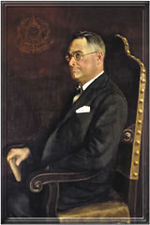
Carlos de Campos
Encyclopedia

Carlos de Campos (ˈkaɾlus dʒi ˈkɐ̃pus; August 6, 1866—April 27, 1927) was a Brazilian politician, and president of the state of São Paulo
São Paulo
São Paulo is the largest city in Brazil, the largest city in the southern hemisphere and South America, and the world's seventh largest city by population. The metropolis is anchor to the São Paulo metropolitan area, ranked as the second-most populous metropolitan area in the Americas and among...
for several months in 1924.
He was a native of Campinas
Campinas
Campinas is a city and municipality located in the coastal interior of the state of São Paulo, Brazil. is the administrative center of the meso-region of the same name, with 3,783,597 inhabitants as of the 2010 Census, consisting of 49 cities....
, São Paulo state, son of Bernardino De Campos (who also was a president of that state). He graduated with a law degree from the College of the Plaza of Saint Francis in 1887. Interested in music, he was a composer and founding member of the São Paulo Academy of Words, and became its sixteenth chairman. His political career began when he was member of the Board of Municipal Intendancy Support in 1890. Shortly afterwards he served as state deputy, from 1895 up to 1915, being Chairman of the Board between 1907 and 1915. In 1896 already he had the busy position of Secretary of State for Justice. Between 1915 and 1918 he was a state senator. Moving up to the federal level, he was representative (1918/1923) and became leader of the majority in the government of President Epitácio Pessoa
Epitácio Pessoa
Epitácio Lindolfo da Silva Pessoa was a Brazilian politician and jurist, and president of the republic between 1919 and 1922, when Rodrigues Alves could not take office due to illness after being elected in 1918...
. He initiated his term as president of the State of São Paulo on May 1, 1924. As state governor, on July 5, 1924, the Lieutenants' Revolution erupted, compelling him to take refuge in Guaiaúna, where the legalist forces were concentrated. Under this administration the Guarda Civil was created, and the Public Force started to count on a flotilla of airplanes. He died in São Paulo, before fulfilling his term, on April 27, 1927. The remaining time in his term was served by the President of the State Senate, Antônio Dino da Costa Bueno, as thirteenth President.

